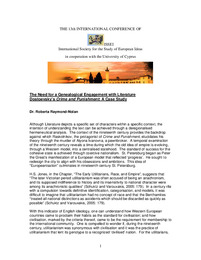| dc.contributor.author | Raymond-Nolan, Dr. Roberta | en |
| dc.contributor.editor | Papastephanou, Marianna | en |
| dc.contributor.editor | Gregoriou, Zelia | en |
| dc.contributor.editor | Koutselini, Mary | en |
| dc.contributor.editor | Zembylas, Michalinos | en |
| dc.creator | Raymond-Nolan, Dr. Roberta | en |
| dc.date.accessioned | 2013-03-28T07:48:31Z | |
| dc.date.available | 2013-03-28T07:48:31Z | |
| dc.date.issued | 2012-07 | |
| dc.identifier.uri | http://gnosis.library.ucy.ac.cy/handle/7/65000 | |
| dc.identifier.uri | http://hdl.handle.net/10797/6257 | |
| dc.description.abstract | Readers often approach texts as artifacts, metaphors for a regimented history that has already occurred and that has been crystallized into the present concept of �progress�.This paper suggests that Literature must be examined as a tool to cognitively access an instant of the reader�s being-in-time, through a dialectical investigation � and communion with � the author�s indication of ideas that are not within our physical purview. The intellect must be challenged to consider stretched time so that the distinction of �time labels� can no longer instrumentalise the discussion of deregionalised ideas. This paper strives to reveal ideas that are permeating 19th century Western Europe, as they are reflected in Dostoevsky�s Crime and Punishment. The text will act as a case-study exemplifying the need for a genealogical engagement with fictional texts as possible documents of historiography. | en |
| dc.language.iso | eng | en |
| dc.rights | info:eu-repo/semantics/openAccess | en |
| dc.rights | Open Access | en |
| dc.subject | Literature, Cultural Studies, Interdisciplinary Studies | en |
| dc.title | The Need for a Genealogical Engagement with Literature Dostoevsky’s Crime and Punishment: A Case Study | en |
| dc.type | info:eu-repo/semantics/conferenceObject | en |
